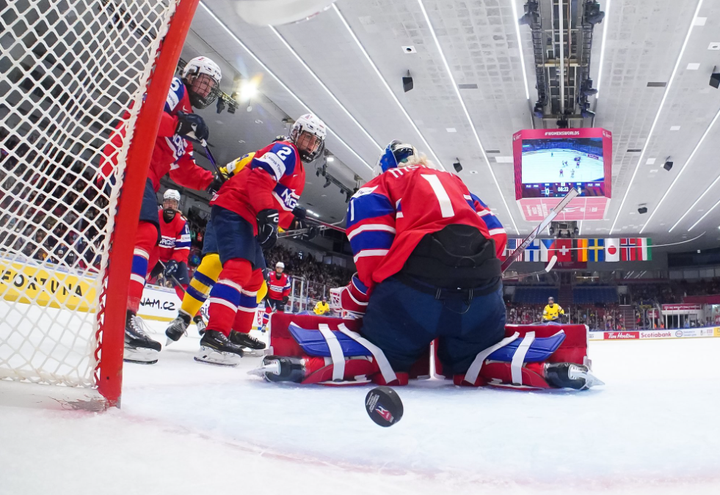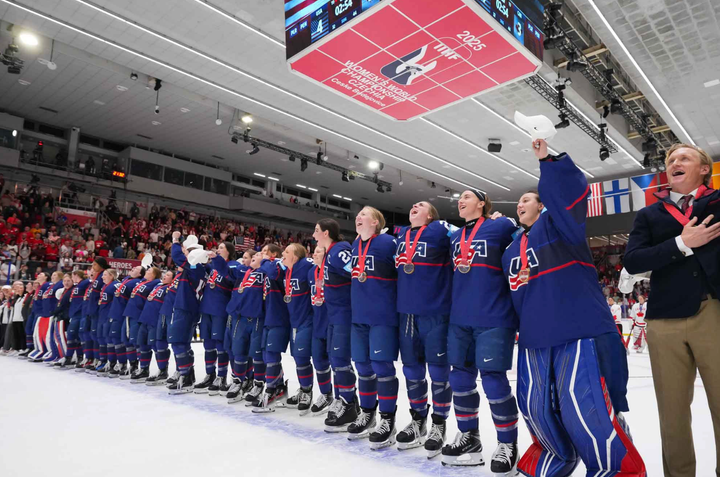The Pegulas, Penn State, and their past involvement in women’s hockey
The Pegulas, and PSE, have helped support women’s hockey at the college level for years. What’s that say about their future in pro hockey?
Last week, it was announced that Pegula Sports and Entertainment (PSE) was ending its relationship with the NWHL and handing ownership of the Buffalo Beauts back to the league. Since then, there’s been plenty of speculation about the move, PSE’s investment in women’s hockey, and how this will shape the professional women’s game moving forward.
Some have speculated that the move was a direct response to the #ForTheGame movement and the decision by hundreds of players to sit out the upcoming season. However, The Victory Press reported that PSE’s decision had been considered prior to the movement and “may have been inevitable.”
Others have also questioned whether the move was financially motivated, and if there’s reason to be concerned about the viability of any women’s professional league moving forward. It’s well-known that Beauts players, under PSE, received the most support and resources of any NWHL team and were treated like living, breathing professionals, to a much greater extent than their counterparts on other teams.
But the Pegulas have a history of helping to support women’s hockey and the growth of the game at large even before they got involved with the Beauts. Their track record in Happy Valley and PSE’s tangential support of women’s college hockey could lend some insight into what went into their decision to part ways with the Beauts franchise, and their future investment in the pro game.
The Pegulas and Penn State
In 2010, Terry and Kim Pegula announced the donation of an $88 million gift to Penn State, which would go to fund a state-of-the-art, dual-purpose arena with two ice rinks. That was the largest private gift in the university’s history, and the Pegulas later donated another $14 million in 2012. The facility has since been named Pegula Ice Arena, with a seating capacity of 5,782 in the main rink, and 300 in the community rink.
The Pegulas’ gift has rightly been lauded as the launching point for Penn State’s Division I men’s hockey program. As soon as the gift and ensuing arena project were announced by Penn State, it was explicitly stated that it would help establish a Division I men’s hockey team in Happy Valley; at the time, men’s hockey was a club sport on campus. Fast forward nine years later, and that’s exactly what’s happened. Penn State became a varsity program; the Big 10 men’s hockey conference was formed and the existing order of conference alignment in men’s college hockey was thrown into chaos. End of story, right?
Not quite. With their gift, the Pegulas also had the intention of fostering more growth for hockey in PA by providing programming and facilities for youth programs, and those who had never been exposed to the game before. Almost a decade later, and that programming is still a staple of Pegula Ice Arena.
And while the gift wasn’t announced as a way to explicitly fund a women’s program, too, the Pegulas certainly paved the way for that to happen. From day one, starting a Division I women’s program was the goal as well, and the intention to do so was stated in the official announcement. And when it comes to the amenities at Pegula Ice Arena, there is no difference between what Penn State’s men’s and women’s teams receive. The locker rooms are identical to each other; this is not especially common in college hockey, particularly in the case of brand new facilities. Both teams use the same weight room, and their lounges have the same amenities.
Finally, it’s worth noting that Pegula Ice Arena, and the Pegulas’ $102 million gift, was exactly that: a gift. They maintain no ownership stake in the arena, so they don’t make any profits off of ticket sales, venue rentals, or any other revenue stream. Every dollar that the arena produces goes back to the university. This is especially paramount to note because it goes to show that this was not a business move; there’s no ROI on this; Kim and Terry Pegula had no intentions of profiting off of this donation. They could simply afford to part with that sum of money and decided to use it as a gift, both for Penn State to reap the benefits and to help grow the game—for men and women.
HarborCenter and College Hockey America
For the past four seasons, the College Hockey America Tournament has been held at the HarborCenter, the state-of-the-art facility that is owned and operated by PSE and the previous home of the Buffalo Beauts franchise as well.
It would be egregious to pretend that women’s college hockey is a revenue-generating sport for any conference, and the CHA is not immune from this. Since the women’s division of the conference was formed in 2002, the CHA has seen a good amount of turnover among its member teams. Mercyhurst is the only inaugural CHA team that is still active in the conference today. Because of that, the conference only recently earned an automatic bid into the NCAA Tournament, achieving this in the 2014-15 season after it reached the minimum of six teams required for the bid in 2012-13. Lindenwood, Mercyhurst, Penn State, RIT, Robert Morris, and Syracuse have all remained in the conference since then, and all six teams compete in the three-day postseason tournament.
When the CHA Tournament moved to the HarborCenter, Commissioner Robert DeGregorio stated that “HarborCenter is a top notch facility that has shown that it can support the sport of women’s ice hockey to its fullest extent.” Nik Fattey, then the vice president and director of hockey at the facility, noted in an article by Buffalo Business First that the move was “a good fit for everyone.”
But while women’s college hockey (College Hockey America included) puts a great product on the ice, it’s still not a very hot ticket, particularly outside of the Midwest. The CHA Tournament isn’t bringing sellout crowds to the HarborCenter annually. Still, it’s an event that the facility has felt is pertinent enough to include in its programming for the past four seasons, and there are certainly tangible long-term benefits as the CHA continues to grow.
There’s no doubt, too, that the HarborCenter provides CHA teams with a good home to battle it out for postseason glory, which only serves to help the league gain a stronger foothold and maintain some much-needed stability. Similar to the Pegulas’ gift to Penn State, there are direct benefits of this partnership with the HarborCenter that are helping the women’s game continue to grow.
This type of relationship with the Pegulas and HarborCenter has existed for years outside of professional women’s hockey, and it should be an indication that PSE is not out of the pro game for good, either. As Kim Pegula stated in PSE’s official announcement regarding the Beauts, they have always intended to foster growth in women’s hockey across all ages, and they’ve got the track record and the means to show that they’ll be active in the game’s future, and whatever may be on the horizon.





Comments ()